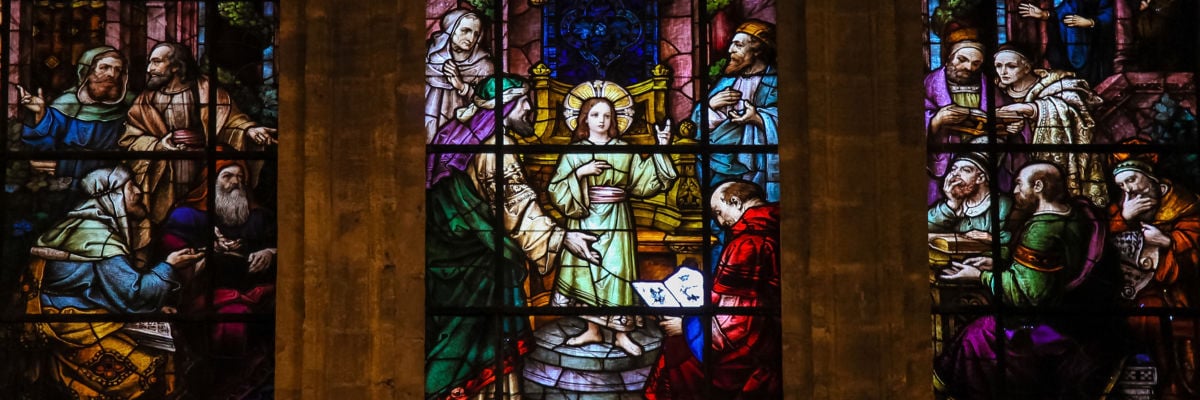
The temple in Jerusalem was one of the most impressive buildings of the ancient world. And, although it functioned as a place of ritual sacrifice and prayer, it was also as a place of study, the center of a vast network of Jewish schools and synagogues that stretched throughout the Roman world and beyond. This network of institutions around the empire presented a compelling alternative to paganism, and through it many Gentiles came to accept the one God.
Whether you were a Jew or a gentile, if you wanted to devote yourself to learning about the God of Israel from the greatest minds and the most respectable schools of thought, you went to the temple in Jerusalem. During the life of Jesus, the great teachers Hillel and Shammai taught the Jewish law at the temple. In fact, they might have been there when, just on the cusp of adulthood, Jesus found his way to the temple:
Now his parents went to Jerusalem every year at the feast of the Passover. And when he was twelve years old, they went up according to custom; and when the feast was ended, as they were returning, the boy Jesus stayed behind in Jerusalem. His parents did not know it, but supposing him to be in the company they went a day’s journey, and they sought him among their kinsfolk and acquaintances; and when they did not find him, they returned to Jerusalem, seeking him.
After three days they found him in the temple, sitting among the teachers, listening to them and asking them questions; and all who heard him were amazed at his understanding and his answers. And when they saw him they were astonished; and his mother said to him, “Son, why have you treated us so? Behold, your father and I have been looking for you anxiously.” And he said to them, “How is it that you sought me? Did you not know that I must be in my Father’s house?”
And they did not understand the saying which he spoke to them. And he went down with them and came to Nazareth, and was obedient to them; and his mother kept all these things in her heart. And Jesus increased in wisdom and in stature, and in favor with God and man (Luke 2:41-52).
Because travel in the ancient world was not always safe, the trip to Jerusalem from Galilee would have been made with a caravan of people, something like a wagon train crossing the Old West. Jesus missed the caravan as it headed home, probably because he had something more he needed to accomplish in Jerusalem. He knew that once his parents noticed that he was not with the group, they would come back looking for him.
And where should they look? Considering what they knew about him from the events of his early life, including the announcements of angels, they should have known that the temple was the logical place for him to go.
As he waited, he entered the religious debates of the wise men at the temple, the world’s leaders in Jewish thought. We are not told what he said, and there seems to be a good reason for this. Luke seems to have gotten the story from Mary, the mother of Jesus, because it is told from her perspective. She and Joseph walked in and saw him “sitting among the teachers, listening to them and asking them questions.”
Perhaps they rushed up to Jesus, and, as they collected him to go home, the scholars said something like, “That’s quite a son you have; he has been astounding us with his understanding and his answers.”
Even though there’s no report of what Jesus actually said, this story is valuable because it fills in biographical facts we would not otherwise know. This is the last story that involves his father Joseph, for example, and it is our only indication that Joseph was alive to raise him beyond infancy.
We also see that his family was religiously observant, and that, although they may have been poor by our standards, they were not destitute. They had the money to go to Jerusalem every year, after all.
We see that he spoke frankly and in a mature way with his parents, but also in a way that makes him slightly strange to them. Even in a society in which a twelve-year-old is trusted with a great deal of responsibility, and is much closer to the full responsibility of adulthood than a child of twelve would be today, his reply to his parents is surprisingly manly: “How is it that you sought me? Did you not know that I must be in my Father’s house?”
This is not a child asking the forgiveness of his parents or even reassuring them after their fright. This is a young man who knows who he is and who expects his parents to know as well.
In our modern context we might read this as a kid being too big for his britches and maybe even mouthing off a bit. But in his context, that does not explain his response. A more likely reading is that he truly required more understanding from them. After all that had happened (angels, dreams, wise men, shepherds, etc.) it was long past time for them to fully understand that he was filled with power and that nothing would happen to him that was not the will of heaven.
The question, “Did you not know?” carries with it the implication that they did know, but that they had not yet allowed the knowledge to fully settle in their minds. They were still reserving judgment, at least in some part of themselves, about what all of this meant. Some part of them still focused on him as their little boy more clearly than it focused on him as the son of God.
The son of God had been entrusted to them, and now, he needed them to surrender that heavy burden. Without doubt, part of the reason for his staying in Jerusalem was that he intended to move his own parents beyond their fears for his safety. He arranged the situation so that they could begin to let him go.
In fact, as a twelve-year-old male, he almost certainly had the right to stay in Jerusalem if he wanted. But by asserting his right in the way he did, he allowed things to develop for his parents’ benefit. He allowed a drama to unfold that, even if they did not understand it at the time, changed all of their roles. He moved from the role of protected child into the role of teacher and savior. They moved from the role of protectors into the role of followers who must trust his choices. Once this change in roles was accomplished, he was able to return home with them and obey them, confident that they would no longer confuse his obedience with vulnerability.
Otherwise, it they had continued to think of him as a vulnerable child, his obedience would have become a source of hurt to them. It would have left them feeling that they were stuck with an impossible job—keeping God safe.
It was time for that burden to be taken off their shoulders.
This article is excerpted from Cy Kellett’s new book, A Teacher of Strange Things, now available for purchase at the Catholic Answers shop.



